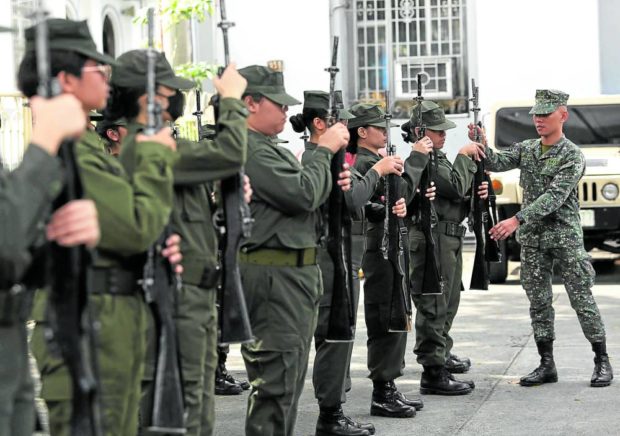Galvez assures lawmakers: Mandatory ROTC can be implemented

ROTC REVIVAL |. A Marine trains a group of students enrolled in the Reserve Officers’ Training Corps (ROTC) on how to handle a rifle. A Senate bill is seeking to revive mandatory ROTC, but this could be hampered by a lack of military personnel to conduct the training. (Photo by MARIANNE BERMUDEZ / Philippine Daily Inquirer)
MANILA, Philippines — The Department of National Defense (DND) on Saturday assured senators that it could implement a law they are proposing to make the Reserve Officers’ Training Corps (ROTC) program mandatory despite doubts and reservations expressed by one of its officials on whether it could be done due to a lack of resources.
In a statement on Saturday, Defense Secretary Carlito Galvez Jr. said the DND “fully supports and greatly appreciates” the legislators led by Sen. Ronald “Bato” dela Rosa pushing for the law.
According to Galvez, the DND and the Armed Forces of the Philippines, in coordination with the Commission on Higher Education (CHEd) and supporting agencies, already knew how the proposed mandatory ROTC program would be run.
“We can implement this using a ‘phased approach’ wherein we will have pilot and simulation runs in selected universities, while preparing our personnel, logistical and budgetary requirements for its full implementation,” he explained.
Timeline
According to Galvez, the projected timeline from enactment of the law to initial implementation is two to three years, while full implementation could be done in five years.
Article continues after this advertisementThe DND and AFP also intend to harness the expertise of reservist groups from the Regional Community Defense Groups (RCDGs) of the Philippine Army, Air Reserve Centers (ARCENs) of the Philippine Air Force, and Naval Reserve Centers (NRCENs) of the Philippine Navy around the country in managing the ROTC program to cope with any lack of manpower, he said.
Article continues after this advertisementThe AFP currently has more than 143,000 active personnel, and 700,000 total ready reserve force.
Galvez said the law would be “be diligently implemented in coordination with our partner agencies and institutions, including the private sector organizations in order to ensure its success.”
Bato irked
During Wednesday’s hearing on a bill to make ROTC mandatory again, Dela Rosa, one of the proponents of the measure, was fuming over the supposed half-hearted support from the DND to the proposed law.
Defense Undersecretary Franco Nemesio Gacal warned that the program could face a lack of manpower.
He said that the military would need to deploy at least 9,000 to 10,000 personnel to run the program, assuming that there were 2,400 schools in the country where this could be implemented and that four members of the military would be assigned to each. The estimate did not include those needed for technical-vocational institutions.
Col. Ronald Jess Alcudia, executive officer of the AFP reservist and retiree affairs, said they could not provide enough personnel to all units even in the current optional ROTC program that only has 330,000 cadets.
“The requirement is really enormous … [the Technical Education and Skills Development Authority] and out-of-school youth are not yet included here,” Gacal said.
The number of personnel needed to run the program nationwide would be equivalent to around two infantry divisions.
Gacal’s statement angered Dela Rosa. “Let’s stop this. Let us go back to NSTP (National Service Training Program)!” the former national police chief said. “You want to give the job to the CHEd and to the Tesda, then let’s drop this!”
Pressed by Dela Rosa on whether the military could handle the mandatory ROTC program, Alcudia said it could but “with the proper support and logistics.”
Budget support
Senators Sherwin Gatchalian and Francis Tolentino assured the DND and the AFP of budgetary and logistical support to implement the program. Senators Jinggoy Estrada and Robin Padilla also filed similar bills to revive mandatory ROTC.
During his first State of the Nation Address in July last year, President Marcos said that among his priority legislation was making ROTC in Grade 11 and Grade 12 mandatory.
The mandatory ROTC was scrapped in 2002, after the NSTP Act was signed by then-President Gloria Macapagal-Arroyo.
The law allowed college students to choose among ROTC, Literacy Training Program or Civil Welfare Training Service as part of their required three-unit NSTP program.
The law was pushed in Congress following the March 2001 killing of University of Santo Tomas sophomore cadet Mark Wilson Chua allegedly by his ROTC handlers after he exposed the corruption in his school’s military training program.
In May 2019, the House of Representatives, passed on third and final reading House Bill No. 8961, which seeks to institutionalize, develop, train, organize and administer basic ROTC in Grades 11 and 12 in all public and private schools. The Senate, however, failed to pass its counterpart bill.